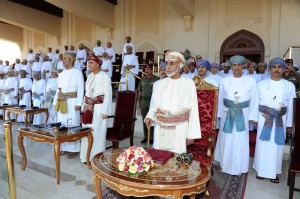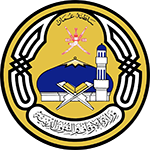Organisation of Power
 In 1971, Sultan Qaboos bin Said was confronted with insurgency in a country plagued by endemic disease, illiteracy, and poverty. One of the new Sultan’s first goal was to establish a modern government structure and launch a major development program to upgrade educational and health facilities, build a modern infrastructure, and develop the country’s natural resources.
In 1971, Sultan Qaboos bin Said was confronted with insurgency in a country plagued by endemic disease, illiteracy, and poverty. One of the new Sultan’s first goal was to establish a modern government structure and launch a major development program to upgrade educational and health facilities, build a modern infrastructure, and develop the country’s natural resources.
Over the years, Sultan Qaboos encouraged the development of a government, and by the mid-70’s, had created various Ministries, whilst personally overseeing the structure and function of internal security, finance, defense and oil affairs. By 1979, the Omani cabinet had grown from 8 members to 23 and.
In 1981, the Sultan ordered the establishment of the Majlis al Dawla, a State Consultative Council designed to provide Oman’s citizens with a greater opportunity to participate in the efforts of the country’s government.
On November 6, 1996, Sultan Qaboos issued a royal decree promulgating the “Basic Statute of the State,” Oman’s first written “constitution.” It clarifies the royal succession, provides for a prime minister, bars ministers from holding interests in companies doing business with the government, establishes a bicameral parliament, and guarantees basic rights and responsibilities for Omani citizens.
The Sultan
He is the monarch, in charge of executive power. He is both the chief of State and head of Government. He appointed the Cabinet. The Monarchy is hereditary.
The Cabinet
The government helps the Sultan to achieve the general politic of the country. It consist to 32 ministers, three of them are women: Tourism, Education and Socials Affairs.
The Council of Oman (Majlis Oman)
Oman’s government is a bicameral system. The Basic Statute of the State provided for the establishment of The Council of Oman which was created by Royal Decree in 1997. It comprises the Majlis a’Shura (Consultative Council), whose members are elected by Omani citizens every three years, and the Majlis Al Dawla (State Council), whose members are appointed by the Sultan.
The State Council (Majlis al Dawla)
Acting as an upper chamber, the State Council is central to Oman’s development goals. It reaffirms the established process of Shura (consultation). Appointed for their expertise at senior levels in various fields, State Council members represent a wide range of views and experiences. The Council examines the issues presented to it, preparing studies on development and solving problems, and promotes cohesion and unity.
The State Council’s president and members are prominent members of the Omani community chosen for their expertise and seniority and appointed by Royal Decree. State Council members must be Omani nationals, aged 40 years and above, of high status and reputation and with appropriate practical experience. Membership is for three years and is renewable.
Royal Decree 86/97 defines the State Council’s powers. These include preparing studies to help to implement development plans and programmes, finding solutions to economic and social problems and proposing ways to encouraging investment, reforming the administration and improving performance. The Council has the power to review and revise draft laws prepared by ministries and government departments, and to propose draft amendments.
The Consultative Council (Majlis al-Shura)
In December 1991, Sultan Qaboos inaugurated the Majlis al-Shura, the Consultative Council which complemented the Majlis al Dawla. 59 members represented each of the wilayats in Oman and each one, with the exception of the President, is an elected member.
The two vice-presidents are elected by the membership of the Council in a secret ballot. Due to increases in population, the original 59 members of the Council have now increased to 82 in order to serve those wilayats with a population of more than 30,000.
Women are welcomed into the Majlis al-Shura and are invited to put forward their own names as nominees for membership of the assembly. In 1971, Sultan Qaboos bin Said was confronted with insurgency in a country plagued by endemic disease, illiteracy, and poverty. One of the new Sultan’s first goal was to establish a modern government structure and launch a major development program to upgrade educational and health facilities, build a modern infrastructure, and develop the country’s natural resources.
In 1971, Sultan Qaboos bin Said was confronted with insurgency in a country plagued by endemic disease, illiteracy, and poverty. One of the new Sultan’s first goal was to establish a modern government structure and launch a major development program to upgrade educational and health facilities, build a modern infrastructure, and develop the country’s natural resources.
Over the years, Sultan Qaboos encouraged the development of a government, and by the mid-70’s, had created various Ministries, whilst personally overseeing the structure and function of internal security, finance, defense and oil affairs. By 1979, the Omani cabinet had grown from 8 members to 23 and.
In 1981, the Sultan ordered the establishment of the Majlis al Dawla, a State Consultative Council designed to provide Oman’s citizens with a greater opportunity to participate in the efforts of the country’s government.
On November 6, 1996, Sultan Qaboos issued a royal decree promulgating the “Basic Statute of the State,” Oman’s first written “constitution.” It clarifies the royal succession, provides for a prime minister, bars ministers from holding interests in companies doing business with the government, establishes a bicameral parliament, and guarantees basic rights and responsibilities for Omani citizens.
The Sultan
He is the monarch, in charge of executive power. He is both the chief of State and head of Government. He appointed the Cabinet. The Monarchy is hereditary.
The Cabinet
The government helps the Sultan to achieve the general politic of the country. It consist to 32 ministers, three of them are women: Tourism, Education and Socials Affairs.
The Council of Oman (Majlis Oman)
Oman’s government is a bicameral system. The Basic Statute of the State provided for the establishment of The Council of Oman which was created by Royal Decree in 1997. It comprises the Majlis a’Shura (Consultative Council), whose members are elected by Omani citizens every three years, and the Majlis Al Dawla (State Council), whose members are appointed by the Sultan.
The State Council (Majlis al Dawla)
Acting as an upper chamber, the State Council is central to Oman’s development goals. It reaffirms the established process of Shura (consultation). Appointed for their expertise at senior levels in various fields, State Council members represent a wide range of views and experiences. The Council examines the issues presented to it, preparing studies on development and solving problems, and promotes cohesion and unity.
The State Council’s president and members are prominent members of the Omani community chosen for their expertise and seniority and appointed by Royal Decree. State Council members must be Omani nationals, aged 40 years and above, of high status and reputation and with appropriate practical experience. Membership is for three years and is renewable.
Royal Decree 86/97 defines the State Council’s powers. These include preparing studies to help to implement development plans and programmes, finding solutions to economic and social problems and proposing ways to encouraging investment, reforming the administration and improving performance. The Council has the power to review and revise draft laws prepared by ministries and government departments, and to propose draft amendments.
The Consultative Council (Majlis al-Shura)
In December 1991, Sultan Qaboos inaugurated the Majlis al-Shura, the Consultative Council which complemented the Majlis al Dawla. 59 members represented each of the wilayats in Oman and each one, with the exception of the President, is an elected member.
The two vice-presidents are elected by the membership of the Council in a secret ballot. Due to increases in population, the original 59 members of the Council have now increased to 82 in order to serve those wilayats with a population of more than 30,000.
Women are welcomed into the Majlis al-Shura and are invited to put forward their own names as nominees for membership of the assembly.

